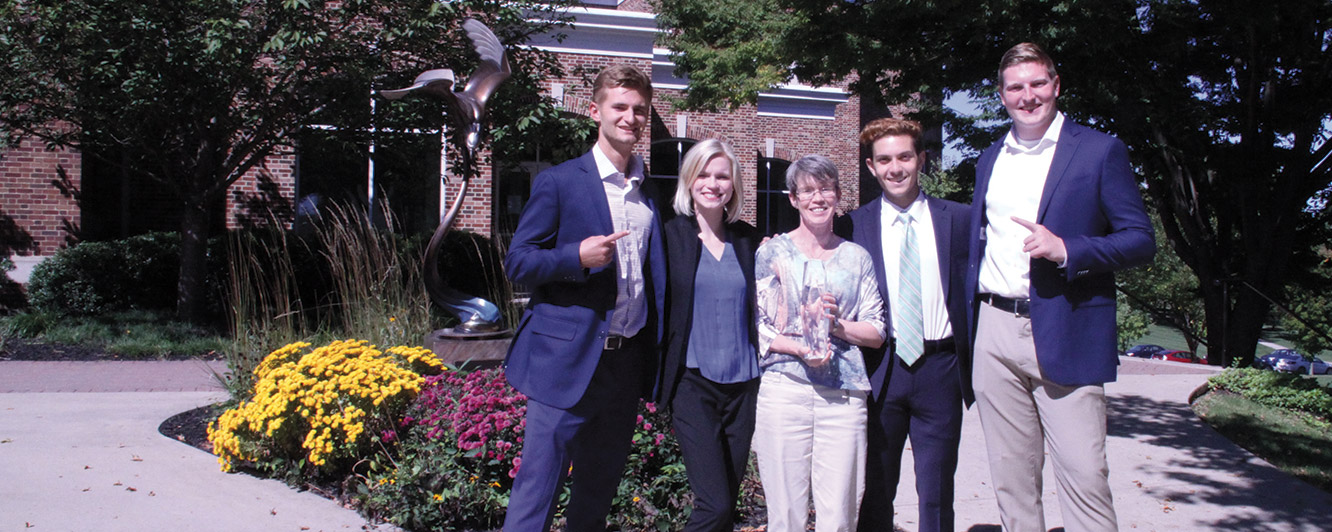Throughout their Juniata career, students participate in a wide variety of highimpact practices, which utilize active learning and student engagement in a project to develop transferrable knowledge and skills. High-impact practices can take the form of writing-intensive classes, internships, learning communities, and research projects such as this bank case study.
The students researched the effect of the Economic Growth, Regulatory Relief and Consumer Protection Act, otherwise known as the Dodd-Frank legislation, on local banks and were given “unfettered access to top executives at Kish Bank,” according to Gallagher.
“If I hadn’t gone on this trip, there are connections I wouldn’t have made.”Katherine Migatulski ’19, Boiling Springs, Pa.
Juniata’s team consisted of seniors David Hibner ’20, Matt Schaeffer ’20, Wyatt Page ’20, and Katherine Migatulski ’19. Despite already busy schedules, they found time to not only research the policy but also meet with top executives at Kish Bank to get a look at real-life effects of the legislation.
Students used most of what free time they had left to pursue this project and they really put their all into it. Matt gave a lot of the credit for their focus to their faculty advisor saying, “We couldn’t have done it without Professor Gallagher. She was instrumental in keeping us on track and motivated.”
Their final project was titled, “Too Big to Fail, Too Small to Succeed, and the Piggy (Bank) in the Middle.” Kish Bank is headquartered in Belleville, Pa., a rural, agricultural community. Banks serving rural areas are often the only bank serving an area, but with limited residents, are in a precarious state where new legislation can have noticeable affects on operations. The Dodd-Frank legislation was introduced to “lighten the government grip on the banking industry, primarily community banks.” However, in their meetings with Kish, it became clear that rather than the legislation helping, it was hurting the bank.
This topic was new for all of the students involved and sparked the acquisition of new skills for them. Katherine said this project “pushed me to do a lot of things I didn’t know I could do. Speaking in front of 200 people, many of whom have important positions in banking, you don’t want to mess up.” Her teammates expressed similar nerves before the big presentation at the 21st Century Research and Policy Conference at the CSBS-Federal Reserve Community Banking–FDIC in Saint Louis, Missouri. While they may have been nervous, it certainly did not show. According to Schaeffer, “a lot of people came up to us afterwards and said we did a good job.” One of those people included the CEO of the FDIC Jelena McWilliams who congratulated them on their work.
In the announcement of the winner, CSBS senior executive vice president Michael L. Stevens said, “Our winner this year, Juniata College, demonstrated excellent analytical skills and creativity to produce a high-quality product.”
The process was beneficial to students not just in the immediate sense of gaining experience, but also in their broader personal, professional, and academic lives. After explaining that the report had been published in the CSBS Journal of Community Bank Case Studies, Wyatt remarked, “I can call myself an author now,” which will help bolster his resume but also gives a sense of pride and accomplishment.
Matt emphasized how this experience helped him grow in his ability to work in groups to create a cohesive product and gave him “more confidence to do things that may seem too hard or out of reach.”
In a display of humility, not one of the students said they thought they would win. In their own words, the win was “surprising”, “shocking,” and “unexpected.”
“We knew we did a pretty good job, but didn’t know how the competition would stack up,” Matt said. “We didn’t realize we had a chance of winning until we were in the top three.”
For David, winning “was a good feeling. We had put a lot of work into it,” and to see that work pay off was “amazing and unexpected.”
Having bankers come up afterward was an incredibly rewarding sensation for the team members.
“If I hadn’t gone on this trip, there are connections I wouldn’t have made,” said Katherine, adding that she’s kept in contact with some of the executives through email and LinkedIn. This experience has only grown her interest in banking and provided her with valuable contacts post-graduation.
Each student also won a $1,000 scholarship from the CSBS.
The final report can be read in the CSBS Journal of Community Bank Case Studies.






